|
|
|
Sort Order |
|
|
|
Items / Page
|
|
|
|
|
|
|
| Srl | Item |
| 1 |
ID:
188126
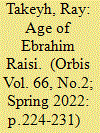

|
|
|
|
|
| Summary/Abstract |
The Islamic Republic of Iran finds itself in an unusual paradox. It is a regime that is growing stronger in the region while weaker at home. The mullahs will stand as Persia’s most dedicated and ardent imperialists, who have implanted their influence throughout the Middle East. Iran has prolonged regional civil wars, harassed Arab potentates, and reduced the once proud Arab nation of Iraq into a vassal state. Yet, it is at home that the regime faces its most significant challenges. Ebrahim Raisi, Iran’s new dogmatic and unimaginative president, is facing a depleted economy, popular protests, and massive corruption. The clerical oligarchs have no answer to Iran’s mounting problems. It remains unclear whether the regime can survive the many predicaments of its own making.
|
|
|
|
|
|
|
|
|
|
|
|
|
|
|
|
| 2 |
ID:
188129
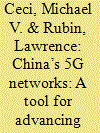

|
|
|
|
|
| Summary/Abstract |
This article examines the claim that the People’s Republic of China (PRC) promotes its commercial interests in building 5G network infrastructure abroad to advance digital authoritarianism. Critics view China’s actions as part of a well-coordinated, strategic effort to promote authoritarian values, spread its version of authoritarianism, and shape global governance norms around information and communication technologies. However, concerns over China’s 5G infrastructure in supporting digital authoritarianism may be overstated. This essay finds that geopolitical dynamics and local economic considerations challenge China’s capacity to influence governance practices and questions the notion that China’s promotion of its 5G network infrastructure has a clear political, strategic intent. The findings suggest that the United States needs to refocus its messaging around the geopolitical and security risks associated with greater dependence on Chinese digital infrastructure as well as create new industrial policies to better compete economically in 5G.
|
|
|
|
|
|
|
|
|
|
|
|
|
|
|
|
| 3 |
ID:
188128


|
|
|
|
|
| Summary/Abstract |
The People’s Liberation Army Navy (PLAN) is rapidly building a blue-water force structure, but little is known about how the service intends to use these new platforms in operations outside of East Asia. This article answers key questions about the future trajectory of the PLAN by examining the service’s strategy of “Far Sea Protection.” It argues that Far Seas Protection is predicated on two desires: (1) to strengthen China’s ability to protect the homeland from attack from the sea and (2) to safeguard the country’s expanding overseas interests. Ultimately, the PLAN intends to do so through the conduct of “far seas mobile operations” with aircraft carrier strike groups, amphibious assault ships, and nuclear-powered submarines. If conflict occurs before these platforms are available to the fleet, the PLAN would conduct asymmetric warfare east of the first island chain, using an approach described as “far seas sabotage guerilla operations.”
|
|
|
|
|
|
|
|
|
|
|
|
|
|
|
|
| 4 |
ID:
188121


|
|
|
| 5 |
ID:
188123
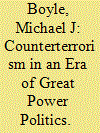

|
|
|
|
|
| Summary/Abstract |
How should the United States recalibrate its counterterrorism policy for an era of great power competition? With the end of unipolarity, the United States cannot fight terrorists and compete with Russia and China with equal energy, but must instead make hard choices about its priorities and resources. Among those hard choices are what to do with the web of counterterrorism partnerships with other governments that have formed in the post- 9/11 era. This article proposes three broad principles—linkages, license, and legitimacy—that the United States can use to evaluate its policy and these partnerships, with the aim of recasting U.S. counterterrorism policy for an era of great power competition.
|
|
|
|
|
|
|
|
|
|
|
|
|
|
|
|
| 6 |
ID:
188119
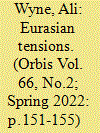

|
|
|
|
|
| Summary/Abstract |
With tensions over Ukraine growing, the Biden administration finds itself confronting a similar charge to one that dogged the Obama administration in the run-up to and aftermath of Russia’s annexation of Crimea: namely, that it is exhibiting weakness that could embolden Moscow and other discontents of the post–Cold War settlement. This judgment overstates U.S. agency while discounting the competitive challenges confronting Russia and China.
|
|
|
|
|
|
|
|
|
|
|
|
|
|
|
|
| 7 |
ID:
188122
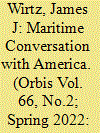

|
|
|
|
|
| Summary/Abstract |
Over the last century, the U.S. Navy has encountered critical moments when the emergence of new technologies and competitors cause paradigmatic shifts, undermining established operations and force structure. Today, the rise of an assertive China and its new anti-access and area-denial capabilities threaten the aircraft carrier-based maritime dominance of the U.S. Navy. Citizens and elected officials alike need to be conversant in the process to create the strategy, forces, and metrics needed to guarantee that the United States wins the emerging maritime competition in the Western Pacific. It is time to explain to the American public the enduring considerations and limitations that shape the operations of their global Navy.
|
|
|
|
|
|
|
|
|
|
|
|
|
|
|
|
| 8 |
ID:
188124


|
|
|
|
|
| Summary/Abstract |
This article revisits the key factors that have reshaped European security to serve as a baseline for framing two distinct paths that will determine the continent’s security architecture in the coming decades. At the center of this discussion is Europe’s answer to the “Russian question”: the role that Russia wants to play in Europe as compared to the level of influence it may be able to achieve through economic pressure and military force. It posits that the answer is inextricably connected to how Germany’s foreign policy evolves going forward, especially the German-Polish relationship and military trilateral cooperation between the United States, Germany, and Poland. It will also touch on the issue of Brexit as arguably the most significant development that will continue to shape European security for years to come, and, by extension, America’s European strategy.
|
|
|
|
|
|
|
|
|
|
|
|
|
|
|
|
| 9 |
ID:
188125


|
|
|
|
|
| Summary/Abstract |
Recent news of hypersonic tests in both Russia and China stoke fears of a technological gap for the United States. However, a sober analysis of the state of hypersonic technology raises doubts of its capabilities, or usefulness in military operations. Instead, overassessment of hypersonics gives them their strategic value: political leverage. A nuclear-tipped hypersonic might not actually tilt the balance of deterrence at all but would nonetheless require a complex arms control negotiation between the United States, Russia, and China. A conventional hypersonic would have to overcome serious technical barriers to even match current precision weapon systems, but not fulling knowing the system’s capabilities means the United States must treat it as a credible threat. Without a careful measure of the technology, policymakers risk diplomatic missteps, budgetary waste, and an escalatory miscalculation.
|
|
|
|
|
|
|
|
|
|
|
|
|
|
|
|
| 10 |
ID:
188120
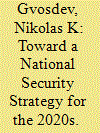

|
|
|
| 11 |
ID:
188118


|
|
|
| 12 |
ID:
188127
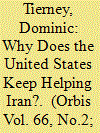

|
|
|
|
|
| Summary/Abstract |
Since the Jimmy Carter administration, Iran has been America’s most consistent enemy. Strangely, however, the United States repeatedly helps its opponent. Following the 9/11 attacks, Washington aided Iran’s interests in six episodes: toppling the Taliban; overthrowing Saddam Hussein; suppressing the ISIS caliphate; backing the Saudi intervention in Yemen; withdrawing from the Iran nuclear deal, and assassinating the Iranian general Qasem Soleimani. Of course, Washington does not deliberately assist its opponent. Rather, the United States unintentionally helps Iran by creating power vacuums, into which Tehran steps, and triggering power surges, or coercive campaigns against Iran, which also tend to backfire and bond Iran more closely with third parties.
|
|
|
|
|
|
|
|
|
|
|
|
|
|
|
|
|
|
|
|
|